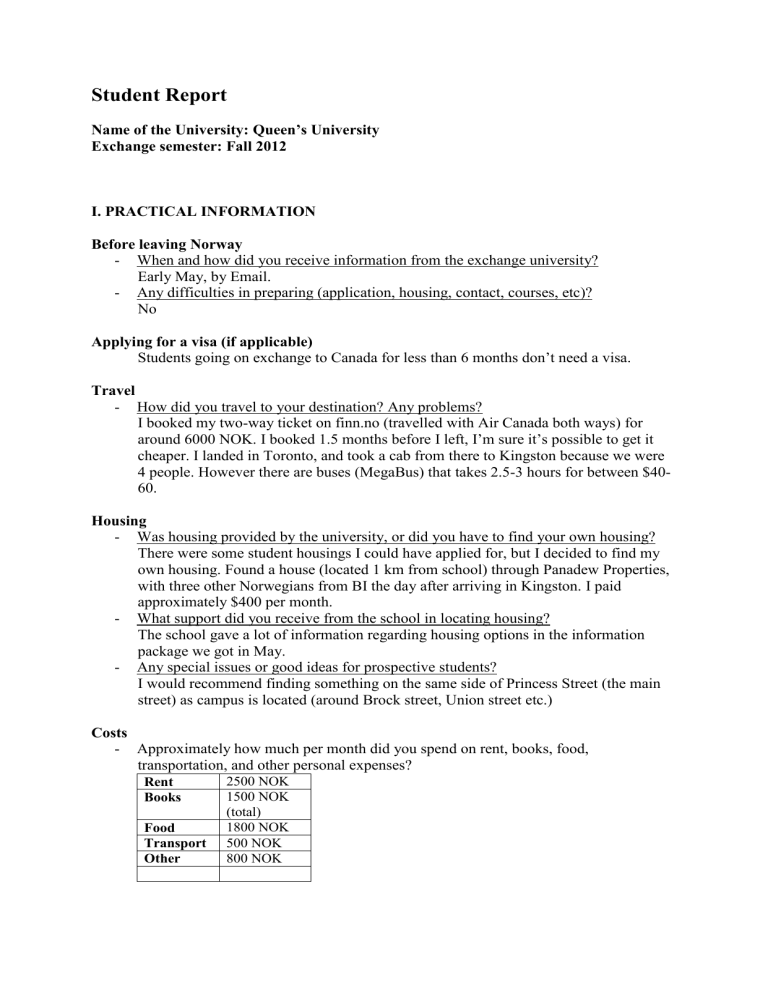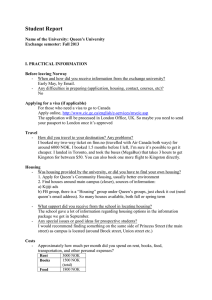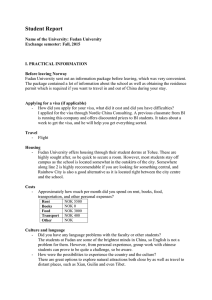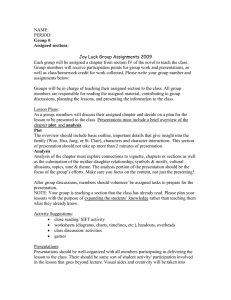Student Report

Student Report
Name of the University: Queen’s University
Exchange semester: Fall 2012
I. PRACTICAL INFORMATION
Before leaving Norway
When and how did you receive information from the exchange university?
Early May, by Email.
Any difficulties in preparing (application, housing, contact, courses, etc)?
No
Applying for a visa (if applicable)
Students going on exchange to Canada for less than 6 months don’t need a visa.
Travel
How did you travel to your destination? Any problems?
I booked my two-way ticket on finn.no (travelled with Air Canada both ways) for around 6000 NOK. I booked 1.5 months before I left, I’m sure it’s possible to get it cheaper. I landed in Toronto, and took a cab from there to Kingston because we were
4 people. However there are buses (MegaBus) that takes 2.5-3 hours for between $40-
60.
Housing
Was housing provided by the university, or did you have to find your own housing?
There were some student housings I could have applied for, but I decided to find my own housing. Found a house (located 1 km from school) through Panadew Properties, with three other Norwegians from BI the day after arriving in Kingston. I paid approximately $400 per month.
What support did you receive from the school in locating housing?
The school gave a lot of information regarding housing options in the information package we got in May.
Any special issues or good ideas for prospective students?
I would recommend finding something on the same side of Princess Street (the main street) as campus is located (around Brock street, Union street etc.)
Costs
Approximately how much per month did you spend on rent, books, food, transportation, and other personal expenses?
Rent 2500 NOK
Books 1500 NOK
(total)
Food 1800 NOK
Transport 500 NOK
Other 800 NOK
Culture and language
Did you have any language problems with the faculty or other students?
No
How were the possibilities to experience the country and the culture?
Great opportunities, especially if you get some Canadian friends (in the exchange program I took, Master of International Business, there were a lot of Canadians in my class). I took the bus (MegaBus) to Toronto, Montreal and Ottawa. Renting a car is cheap, I went to Niagara Falls and New York by car, but you can also take buses.
However the bus to New York takes at least twice as many hours as by car.
Cultural and social effects from the exchange experience
How do you think the exchange experience will affect you from a cultural and social point of view?
Being “forced” to meet and work with people from all over the world was a great experience for me, and I learned a lot about many different cultures. In the program I was in there were approximately 140 students (divided in two classes), and with different courses you got to know almost everyone.
How do you think the exchange experience influences your future career possibilities?
I think it will be easier both to get a job abroad, and in Norway. Before I went on exchange I didn’t even consider working abroad, now I’m much more open to it. I think employers in Norway also appreciate people that have studied abroad, so it’s definitely an advantage when seeking jobs.
II. ABOUT THE SCHOOL
The school and its surroundings (give a short summary)
Kingston is a fairly small city, you can pretty much walk everywhere, and Queen’s
University is located a 5 minutes’ walk from the main street, Princess street. The campus is huge, you couldn’t miss it. The campus is beautiful with a lot of old buildings, football fields, and it’s close to the lake. The program I was in and I think most BI students are, have courses in Goodes Hall, a newly renovated modern building. It’s close to one of several libraries (the Stauffer library), the gym (the Arc),
Queen’s pub and the international centre.
Current faculty divisions and special areas
In my program there were approximately 140 students divided into two classes. As mentioned the school is huge and as a lot of different programs, I’m only familiar with the Master of International business program and the MBA program.
Study structure
Two courses from September to October, and two courses from October to December.
I had no final exams in any of my courses; instead there were several assignments, presentations and class participation that accounted for the grades.
Course registration
Were you able to register for courses before arrival?
Yes. But you can change courses when you arrive if you want to.
When and how long was the period for adding/dropping courses?
A couple of weeks, I would recommend to register before you arrive for the courses that start in September.
Academic calendar
Arrival date:
First day of the semester:
Last day of classes:
Examination period: -
Any special events/holidays: Thanksgiving,
Halloween.
Other:
August 30 th
September 17 th
December 14 th
Arrival
Was the administration and faculty well-prepared for your arrival?
Yes, there was one week of orientation before classes started. (Starting September 4 th
-
Did the school’s students participate in the reception of the exchange students?
).
No.
Describe the introduction week?
There were a lot of information about the exchange program in general, presentation of the professors, how the courses were, about Queen’s university in general, where you could buy books, where you could find health services and so on. We got a tour around campus, and were divided into teams of 8 people to get to know each other.
The International Office
Is there an international office?
Yes.
As an exchange student, did you receive sufficient and relevant information? In
English?
Yes. However we also got some information that wasn’t relevant for exchange students, for example about a school project (called 901) that only students that are staying for a year need to take.
Promoting BI and Norway
What kind of activities were you involved in to promote exchange to Norway at your exchange university?
Most of the people in my program had already applied for their exchanges, and a couple are going to BI the fall of 2013. However we had a cultural night, were we cooked Norwegian food and answered questions about Norway and BI.
Social activities
How was your relationship with native students?
Very good, there were many Canadians in the program, and they were very open to get to know the exchange students.
How was the relationship among the exchange students?
Very good. Since the classes were pretty small, we all got to know each other.
Is there a student organization, and if so, are the exchange students a part of it?
ETC is an organization all exchange students are a part of.
Are there any special activities and gatherings for exchange students?
The international office arranges a lot of gatherings for exchange students.
III. ACADEMICS
In the classroom
Describe the teaching style.
Same as BI, regular Power Point presentations. Class participation required.
Language of instruction? Any problems?
English.
Is the teaching primarily practical or theoretical?
Theoretical, however some of the courses were very practical.
Did professors use cases, group work or lectures (or a combination)?
Combination. We had a lot of cases and group work.
How is the workload compared to that at BI?
-
The workload is distributed throughout the whole semester; at BI I’m more used to final exams counting for almost 100% of the grade.
Describe the relationship between professors and students.
Good. In the smaller classes you get to know the professors well. Many want the students in class to contribute with personal experiences and so on.
Describe the relationship between the students in the classroom.
Very good. The students are a lot more competitive and eager to participate in class than what I’m used to. Many of the teachers have in class group work so it’s easy to get to know people during class also.
Course materials
Describe the course materials used (books/literature, online articles, Powerpoint, etc).
No books, there was a course package that consisted of printed literature, mostly articles. The lectures (Powerpoint slides) are provided online.
In which language were the course materials?
English
How do you estimate the level of the course materials in comparison to BI?
-
The same, the difference is that we didn’t have books.
Were materials used for detailed knowledge or a broad overview of a subject?
Both.
Exams
Was the exam based on the course materials or on the lectures?
Both, mostly the lectures.
How was the course evaluated (include all that apply)? o In-class quizzes throughout semester o Small assignments and/or papers o Presentations o Group work o Class attendance o Class participation/debates o Activities outside of the classroom (field trips)
Library and technology
Do students have easy access to the library and its resources?
Yes.
Were computers provided around campus/in the library?
Yes.
How is technology used in teaching or to distribute information?
Both teachers and students used power point for presentations. We also had an online simulation game for one of the courses. Information is distributed to 3 different portals online, which can be kind of confusing.
Description of courses
Course code & name Master/
Bachelor
MGBL: 804 Global
Strategy
Master
MGBL: 851
Leadership across cultures
MGBL: 833
International
Marketing Strategy
MGBL 831: Products for Global Markets
Master
Master
Master
Exam form
No final exam.
Assignments and presentations
No final exam.
Assignments and presentations
No final exam.
Assignments, presentations and simulation game
No final exam.
Assignments and presentations
Approved as
Elective
Elective
Elective
Elective
Comments
Surprise quizzes during class
Cold calling during class
Field trip and simulation game
Creative course.
You have to “invent” a new product.
Any other experiences/comments about your exchange experience?:
I highly recommend going on exchange, I met so many great people and learned a lot about myself.


